- Home
- Arthur Conan Doyle
The Refugees Page 3
The Refugees Read online
Page 3
"I say, sire, that when the affairs of this world have a bearing upon those of the next, it is indeed the duty of a good priest, as of every other good Catholic, to guide them right."
"That is very true, sire," said De Frontenac, with an angry flush upon his swarthy cheek; "but as long as your Majesty did me the honour to intrust those affairs no my own guidance, I would brook no interference in the performance of my duties, whether the meddler were clad in coat or cassock."
"Enough, sir, enough!" said Louis sharply. "I had asked you about the missions."
"They prosper, sire. There are Iroquois at the Sault and the mountain, Hurons at Lorette, and Algonquins along the whole river cotes from Tadousac in the East to Sault la Marie, and even the great plains of the Dakotas, who have all taken the cross as their token. Marquette has passed down the river of the West to preach among the Illinois, and Jesuits have carried the Gospel to the warriors of the Long House in their wigwams at Onondaga."
"I may add, your Majesty," said Pere la Chaise, "that in leaving the truth there, they have too often left their lives with it."
"Yes, sire, it is very true," cried De Frontenac cordially. "Your Majesty has many brave men within your domains, but none braver than these. They have come back up the Richelieu River from the Iroquois villages with their nails gone, their fingers torn out, a cinder where their eye should be, and the scars of the pine splinters as thick upon their bodies as the fleurs-de-lis on yonder curtain. Yet, with a month of nursing from the good Ursulines, they have used their remaining eye to guide them back to the Indian country once more, where even the dogs have been frightened at their haggled faces and twisted limbs."
"And you have suffered this?" cried Louis hotly. "You allow these infamous assassins to live?"
"I have asked for troops, sire."
"And I have sent some."
"One regiment."
"The Carignan-Saliere. I have no better in my service.
"But more is needed, sire."
"There are the Canadians themselves. Have you not a militia? Could you not raise force enough to punish these rascally murderers of God's priests? I had always understood that you were a soldier."
De Frontenac's eyes flashed, and a quick answer seemed for an instant to tremble upon his lips, but with an effort the fiery old man restrained himself. "Your Majesty will learn best whether I am a soldier or not," said he, "by asking those who have seen me at Seneffe, Mulhausen, Salzbach, and half a score of other places where I had the honour of upholding your Majesty's cause."
"Your services have not been forgotten."
"It is just because I am a soldier and have seen something of war that I know how hard it is to penetrate into a country much larger than the Lowlands, all thick with forest and bog, with a savage lurking behind every tree, who, if he has not learned to step in time or to form line, can at least bring down the running caribou at two hundred paces, and travel three leagues to your one. And then when you have at last reached their villages, and burned their empty wigwams and a few acres of maize fields, what the better are you then? You can but travel back again to your own land with a cloud of unseen men lurking behind you, and a scalp-yell for every straggler. You are a soldier yourself, sire. I ask you if such a war is an easy task for a handful of soldiers, with a few censitaires straight from the plough, and a troop of coureurs-de-bois whose hearts are all the time are with their traps and their beaver-skins."
"No, no; I am sorry if I spoke too hastily," said Louis. "We shall look into the matter at our council."
"Then it warms my heart to hear you say so," cried the old governor. "There will be joy down the long St. Lawrence, in white hearts and in red, when it is known that their great father over the waters has turned his mind towards them."
"And yet you must not look for too much, for Canada has been a heavy cost to us, and we have many calls in Europe."
"Ah, sire, I would that you could see that great land. When your Majesty has won a campaign over here, what may come of it? Glory, a few miles of land Luxembourg, Strassburg, one more city in the kingdom; but over there, with a tenth of the cost and a hundredth part of the force, there is a world ready to your hand. It is so vast, sire, so rich, so beautiful! Where are there such hills, such forests, such rivers? And it is all for us if we will but take it. Who is there to stand in our way? A few nations of scattered Indians and a thin strip of English farmers and fishermen. Turn your thoughts there, sire, and in a few years you would be able to stand upon your citadel at Quebec, and to say there is one great empire here from the snows of the North to the warm Southern Gulf, and from the waves of the ocean to the great plains beyond Marquette's river, and the name of this empire is France, and her king is Louis, and her flag is the fleurs-de-lis."
Louis's cheek had flushed at this ambitious picture, and he had leaned forward in his chair, with flashing eyes, but he sank back again as the governor concluded.
"On my word, count," said he, "you have caught something of this gift of
Indian eloquence of which we have heard. But about these English folk.
They are Huguenots, are they not?"
"For the most part. Especially in the North."
"Then it might be a service to Holy Church to send them packing. They have a city there, I am told. New - New - How do they call it?"
"New York, sire. They took it from the Dutch."
"Ah, New York. And have I not heard of another? Bos - Bos - "
"Boston, sire."
"That is the name. The harbours might be of service to us. Tell me, now, Frontenac," lowering his voice so that his words might be audible only to the count, Louvois, and the royal circle, "what force would you need to clear these people out? One regiment, two regiments, and perhaps a frigate or two?"
But the ex-governor shook his grizzled head. "You do not know them, sire," said he. "They are stern folk, these. We in Canada, with all your gracious help, have found it hard to hold our own. Yet these men have had no help, but only hindrance, with cold and disease, and barren lands, and Indian wars, but they have thriven and multiplied until the woods thin away in front of them like ice in the sun, and their church bells are heard where but yesterday the wolves were howling. They are peaceful folk, and slow to war, but when they have set their hands to it, though they may be slack to begin, they are slacker still to cease. To put New England into your Majesty's hands, I would ask fifteen thousand of your best troops and twenty ships of the line."
Louis sprang impatiently from his chair, and caught up his cane. "I wish," said he, "that you would imitate these people who seem to you to be so formidable, in their excellent habit of doing things for themselves. The matter may stand until our council. Reverend father, it has struck the hour of chapel, and all else may wait until we have paid out duties to heaven." Taking a missal from the hands of an attendant, he walked as fast as his very high heels would permit him, towards the door, the court forming a lane through which he might pass, and then closing up behind to follow him in order of precedence.
CHAPTER III.
THE HOLDING OF THE DOOR.
Whilst Louis had been affording his court that which he had openly stated to be the highest of human pleasures - the sight of the royal face - the young officer of the guard outside had been very busy passing on the titles of the numerous applicants for admission, and exchanging usually a smile or a few words of greeting with them, for his frank, handsome face was a well-known one at the court. With his merry eyes and his brisk bearing, he looked like a man who was on good terms with Fortune. Indeed, he had good cause to be so, for she had used him well. Three years ago he had been an unknown subaltern bush-fighting with Algonquins and Iroquois in the wilds of Canada. An exchange had brought him back to France and into the regiment of Picardy, but the lucky chance of having seized the bridle of the king's horse one winter's day in Fontainebleau when the creature was plunging within a few yards of a deep gravel-pit had done for him what ten campaigns might have failed to accomplish. No
w as a trusted officer of the king's guard, young, gallant, and popular, his lot was indeed an enviable one. And yet, with the strange perversity of human nature, he was already surfeited with the dull if magnificent routine of the king's household, and looked back with regret to the rougher and freer days of his early service. Even there at the royal door his mind had turned away from the frescoed passage and the groups of courtiers to the wild ravines and foaming rivers of the West, when suddenly his eyes lit upon a face which he had last seen among those very scenes.
"Ah, Monsieur de Frontenac!" he cried. "You cannot have forgotten me."
"What! De Catinat! Ah, it is a joy indeed to see a face from over the water! But there is a long step between a subaltern in the Carignan and a captain in the guards. You have risen rapidly."
"Yes; and yet I may be none the happier for it. There are times when I would give it all to be dancing down the Lachine Rapids in a birch canoe, or to see the red and the yellow on those hill-sides once more at the fall of the leaf."
"Ay," sighed De Frontenac. "You know that my fortunes have sunk as yours have risen. I have been recalled, and De la Barre is in my place. But there will be a storm there which such a man as he can never stand against. With the Iroquois all dancing the scalp-dance, and Dongan behind them in New York to whoop them on, they will need me, and they will find me waiting when they send. I will see the king now, and try if I cannot rouse him to play the great monarch there as well as here. Had I but his power in my hands, I should change the world's history."
"Hush! No treason to the captain of the guard," cried De Catinat, laughing, while the stern old soldier strode past him into the king's presence.
A gentleman very richly dressed in black and silver had come up during this short conversation, and advanced, as the door opened, with the assured air of a man whose rights are beyond dispute. Captain de Catinat, however, took a quick step forward, and barred him off from the door.
"I am very sorry, Monsieur de Vivonne," said he, "but you are forbidden the presence."
"Forbidden the presence! I? You are mad!" He stepped back with gray face and staring eyes, one shaking hand half raised in protest,
"I assure you that it is his order."
"But it is incredible. It is a mistake."
"Very possibly."
"Then you will let me past."
"My orders leave me no discretion."
"If I could have one word with the king."
"Unfortunately, monsieur, it is impossible."
"Only one word."
"It really does not rest with me, monsieur."
The angry nobleman stamped his foot, and stared at the door as though he had some thoughts of forcing a passage. Then turning on his heel, he hastened away down the corridor with the air of a man who has come to a decision.
"There, now," grumbled De Catinat to himself, as he pulled at his thick dark moustache, "he is off to make some fresh mischief. I'll have his sister here presently, as like as not, and a pleasant little choice between breaking my orders and making an enemy of her for life. I'd rather hold Fort Richelieu against the Iroquois than the king's door against an angry woman. By my faith, here is a lady, as I feared! Ah, Heaven be praised! it is a friend, and not a foe. Good-morning, Mademoiselle Nanon."
"Good-morning, Captain de Catinat."
The new-comer was a tall, graceful brunette, her fresh face and sparkling black eyes the brighter in contrast with her plain dress.
"I am on guard, you see. I cannot talk with you."
"I cannot remember having asked monsieur to talk with me."
"Ah, but you must not pout in that pretty way, or else I cannot help talking to you," whispered the captain. "What is this in your hand, then?"
"A note from Madame de Maintenon to the king. You will hand it to him, will you not?"
"Certainly, mademoiselle. And how is Madame, your mistress?"
"Oh, her director has been with her all the morning, and his talk is very, very good; but it is also very, very sad. We are not very cheerful when Monsieur Godet has been to see us. But I forget monsieur is a Huguenot, and knows nothing of directors."
"Oh, but I do not trouble about such differences. I let the Sorbonne and Geneva fight it out between them. Yet a man must stand by his family, you know."
"Ah! if Monsieur could talk to Madame de Maintenon a little! She would convert him."
"I would rather talk to Mademoiselle Nanon, but if - "
"Oh!" There was an exclamation, a whisk of dark skirts, and the soubrette had disappeared down a side passage.
Along the broad, lighted corridor was gliding a very stately and beautiful lady, tall, graceful, and exceedingly haughty. She was richly clad in a bodice of gold-coloured camlet and a skirt of gray silk trimmed with gold and silver lace. A handkerchief of priceless Genoa point half hid and half revealed her beautiful throat, and was fastened in front by a cluster of pearls, while a rope of the same, each one worth a bourgeois' income, was coiled in and out through her luxuriant hair. The lady was past her first youth, it is true, but the magnificent curves of her queenly figure, the purity of her complexion, the brightness of her deep-lashed blue eyes and the clear regularity of her features enabled her still to claim to be the most handsome as well as the most sharp-tongued woman in the court of France. So beautiful was her bearing, the carriage of her dainty head upon her proud white neck, and the sweep of her stately walk, that the young officer's fears were overpowered in his admiration, and he found it hard, as he raised his hand in salute, to retain the firm countenance which his duties demanded.
"Ah, it is Captain de Catinat," said Madame de Montespan, with a smile which was more embarrassing to him than any frown could have been.
"Your humble servant, marquise."
"I am fortunate in finding a friend here, for there has been some ridiculous mistake this morning."
"I am concerned to hear it."
"It was about my brother, Monsieur de Vivonne. It is almost too laughable to mention, but he was actually refused admission to the lever."
"It was my misfortune to have to refuse him, madame."
"You, Captain de Catinat? And by what right?" She had drawn up her superb figure, and her large blue eyes were blazing with indignant astonishment.
"The king's order, madame."
"The king! Is it likely that the king would cast a public slight upon my family? From whom had you this preposterous order?"
"Direct from the king through Bontems."
"Absurd! Do you think that the king would venture to exclude a Mortemart through the mouth of a valet? You have been dreaming, captain."
"I trust that it may prove so, madame."
"But such dreams are not very fortunate to the dreamer. Go, tell the king that I am here, and would have a word with him."
"Impossible, madame."
"And why?"
"I have been forbidden to carry a message."
"To carry any message?"
"Any from you, madame."
"Come, captain, you improve. It only needed this insult to make the thing complete. You may carry a message to the king from any adventuress, from any decayed governess" - she laughed shrilly at her description of her rival - "but none from Francoise de Mortemart, Marquise de Montespan?"
"Such are my orders, madame. It pains me deeply to be compelled to carry them out."
"You may spare your protestations, captain. You may yet find that you have every reason to be deeply pained. For the last time, do you refuse to carry my message to the king?"
"I must, madame."
"Then I carry it myself."
She sprang forward at the door, but he slipped in front of her with outstretched arms.
"For God's sake, consider yourself, madame!" he entreated. "Other eyes are upon you."
"Pah! Canaille!" She glanced at the knot of Switzers, whose sergeant had drawn them off a few paces, and who stood open-eyed, staring at the scene.
"I tell you that I will see the king."
<
br /> "No lady has ever been at the morning lever."
"Then I shall be the first."
"You will ruin me if you pass."
"And none the less, I shall do so."
The matter looked serious. De Catinat was a man of resource, but for once he was at his wits' end. Madame de Montespan's resolution, as it was called in her presence, or effrontery, as it was termed behind her back, was proverbial. If she attempted to force her way, would he venture to use violence upon one who only yesterday had held the fortunes of the whole court in the hollow of her hand, and who, with her beauty, her wit, and her energy, might very well be in the same position to-morrow? If she passed him, then his future was ruined with the king, who never brooked the smallest deviation from his orders. On the other hand, if he thrust her back, he did that which could never be forgiven, and which would entail some deadly vengeance should she return to power. It was an unpleasant dilemma. But a happy thought flashed into his mind at the very moment when she, with clenched hand and flashing eyes, was on the point of making a fresh attempt to pass him.
"If madame would deign to wait," said he soothingly, "the king will be on his way to the chapel in an instant."
"It is not yet time."
"I think the hour has just gone."
"And why should I wait, like a lackey?"
"It is but a moment, madame."
"No, I shall not wait." She took a step forward towards the door.
But the guardsman's quick ear had caught the sound of moving feet from within, and he knew that he was master of the situation.
"I will take Madame's message," said he.
"Ah, you have recovered your senses! Go, tell the king that I wish to speak with him."
He must gain a little time yet. "Shall I say it through the lord in waiting?"
"No; yourself."
"Publicly?"
"No, no; for his private ear."
"Shall I give a reason for your request?"
"Oh, you madden me! Say what I have told you, and at once."
But the young officer's dilemma was happily over.

 The Lost World
The Lost World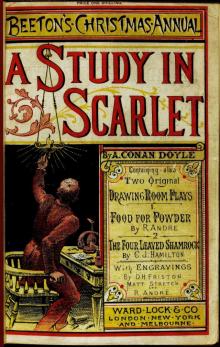 A Study in Scarlet
A Study in Scarlet The Firm of Girdlestone
The Firm of Girdlestone The Cabman's Story
The Cabman's Story The Adventures of Sherlock Holmes
The Adventures of Sherlock Holmes Round the Fire Stories
Round the Fire Stories His Last Bow: An Epilogue of Sherlock Holmes
His Last Bow: An Epilogue of Sherlock Holmes Micah Clarke
Micah Clarke The Exploits of Brigadier Gerard
The Exploits of Brigadier Gerard The Gully of Bluemansdyke, and Other stories
The Gully of Bluemansdyke, and Other stories The Valley of Fear
The Valley of Fear The Last of the Legions and Other Tales of Long Ago
The Last of the Legions and Other Tales of Long Ago The Dealings of Captain Sharkey, and Other Tales of Pirates
The Dealings of Captain Sharkey, and Other Tales of Pirates The Hound of the Baskervilles
The Hound of the Baskervilles The Great Shadow and Other Napoleonic Tales
The Great Shadow and Other Napoleonic Tales The Adventure of the Dying Detective
The Adventure of the Dying Detective The Man from Archangel, and Other Tales of Adventure
The Man from Archangel, and Other Tales of Adventure The Poison Belt
The Poison Belt The Last Galley; Impressions and Tales
The Last Galley; Impressions and Tales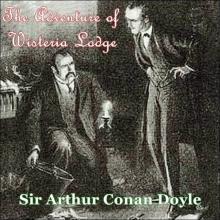 The Adventure of Wisteria Lodge
The Adventure of Wisteria Lodge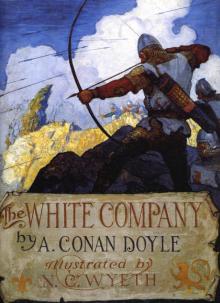 The White Company
The White Company The Mystery of Cloomber
The Mystery of Cloomber The Adventure of the Bruce-Partington Plans
The Adventure of the Bruce-Partington Plans The Adventure of the Cardboard Box
The Adventure of the Cardboard Box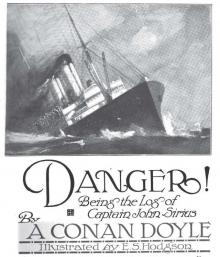 Danger! and Other Stories
Danger! and Other Stories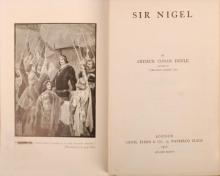 Sir Nigel
Sir Nigel The Return of Sherlock Holmes
The Return of Sherlock Holmes The Adventure of the Devil's Foot
The Adventure of the Devil's Foot The Adventure of the Red Circle
The Adventure of the Red Circle The Memoirs of Sherlock Holmes
The Memoirs of Sherlock Holmes The Adventure of the Yellow Face
The Adventure of the Yellow Face The Adventure of the Norwood Builder
The Adventure of the Norwood Builder Mysteries of Sherlock Holmes
Mysteries of Sherlock Holmes The Adventure of the Missing Three-Quarter
The Adventure of the Missing Three-Quarter The Adventure of the Final Problem
The Adventure of the Final Problem A Scandal in Bohemia
A Scandal in Bohemia His Last Bow shssc-4
His Last Bow shssc-4 Beyond The City
Beyond The City The Adventure of the Gloria Scott
The Adventure of the Gloria Scott The Parasite
The Parasite The Land Of Mist pcs-3
The Land Of Mist pcs-3 The Adventure of the Musgrave Ritual
The Adventure of the Musgrave Ritual The Complete Sherlock Holmes, Volume I (Barnes & Noble Classics Series)
The Complete Sherlock Holmes, Volume I (Barnes & Noble Classics Series) The Adventure of the Stockbroker's Clerk
The Adventure of the Stockbroker's Clerk The Adventure of the Copper Beeches
The Adventure of the Copper Beeches The New Annotated Sherlock Holmes
The New Annotated Sherlock Holmes When The World Screamed pcs-5
When The World Screamed pcs-5 The Adventure of the Six Napoleons
The Adventure of the Six Napoleons The Case Book of Sherlock Holmes shssc-5
The Case Book of Sherlock Holmes shssc-5 The Sign of Four
The Sign of Four Sherlock Holmes Mystery Magazine #10
Sherlock Holmes Mystery Magazine #10 The Adventures of Brigadier Gerard
The Adventures of Brigadier Gerard The Adventure of the Second Stain
The Adventure of the Second Stain The Adventure of the Engineer's Thumb
The Adventure of the Engineer's Thumb The Mummy Megapack
The Mummy Megapack The Disintegration Machine pcs-4
The Disintegration Machine pcs-4 The Maracot Deep
The Maracot Deep The Five Orange Pips
The Five Orange Pips The Adventure of the Crooked Man
The Adventure of the Crooked Man The Adventure of the Blue Carbuncle
The Adventure of the Blue Carbuncle The Adventure of Silver Blaze
The Adventure of Silver Blaze The Adventure of the Solitary Cyclist
The Adventure of the Solitary Cyclist The Adventure of the Naval Treaty
The Adventure of the Naval Treaty Sherlock Holmes. The Complete Stories
Sherlock Holmes. The Complete Stories The Adventures of Sherlock Holmes (sherlock holmes)
The Adventures of Sherlock Holmes (sherlock holmes) The Adventure of the Empty House
The Adventure of the Empty House The Narrative of John Smith
The Narrative of John Smith The Return of Sherlock Holmes (sherlock holmes)
The Return of Sherlock Holmes (sherlock holmes) The New Revelation
The New Revelation A Study in Scarlet (sherlock holmes)
A Study in Scarlet (sherlock holmes) The Vital Message
The Vital Message Sherlock Holmes Complete Collection
Sherlock Holmes Complete Collection Round the Red Lamp
Round the Red Lamp The Boscombe Valley Mystery
The Boscombe Valley Mystery The Adventure of the Beryl Coronet
The Adventure of the Beryl Coronet The Refugees
The Refugees The Adventure of the Three Students.
The Adventure of the Three Students.